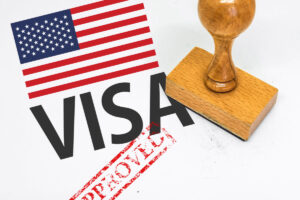Last Updated on December 16, 2022 by Anda Malescu
A
non-citizen non-green card holder (NRA) can become a
U.S. income tax resident by meeting the
Substantial Presence Test (SPT) (by being present in the United States too many days in a calendar year). There are a number of exceptions to the SPT. The article focuses on the student exception and it is written by
our immigration lawyers.
F-Visa and Income Tax Residency
If an NRA meets the student exception they are an “exempt individual” and their days in the United States do not count toward meeting the SPT. In other words, an exempt individual is not considered to be present in the United States for purposes of income tax residency and (subject to the exception discussed below) can continue to be taxed as an NRA even though they might be physically in the United States the entire year. A student may continue to be an exempt individual after the fifth calendar year if the student can establish to the satisfaction of the Internal Revenue Service that he does not intend to permanently reside in the United States and continues to meet the requirements of his F visa.
A student is an individual who is temporarily present in the United States under subparagraphs (F) or (M) of section 101(15) of the Immigration and Nationality Act, or as a student under subparagraphs (J) or (Q) of that section and who substantially complies with the requirements for being so present. Family members (spouse and children) who accompany the student with a companion visa enjoy the same exempt status. The student exception is further leveraged when a non-earning or lower earning spouse is the student.
There is one “trap for the unwary”
While NRAs are not subject to U.S. income tax on their capital gains which are not connected with a business in the United States (think- sale of Microsoft stock, though a sale of U.S. real estate is an important taxable exception), U.S. source (but not worldwide) capital gains of an individual present in the United States more than 182 days in a calendar year are subject to income tax even if the individual is present under an F visa. This trap only applies to U.S. source capital gains since the individual present under an F visa is still an exempt individual.
If a family member who is accompanying the student anticipates recognizing a capital gain, that family member should consider limiting their presence to 182 days in that calendar year. Unlike the student who must be present to attend class, the accompanying family members may enter and depart the United States at will. An individual claiming to be an exempt individual is required to file IRS Form 8843 (though failure of a student to file does not appear to have the same consequences as failure to file by other types of exempt individuals).
Foreign nationals who intend to study in the United States are generally required to obtain an F-1 student visa
Accompanying family members are generally required to obtain an F-2 visa. Prior to the actual visa application, a prospective student must be accepted for a course of study by an educational institution which is certified by the Department of Homeland Security and enrolled in the Student Exchange and Visitor Program (SEVP).
Each SEVP certified school appoints a Designated School Official (DSO) who is responsible to enter all of the student’s information into the SEVP database, which then issues the student an I-20 Certificate of Eligibility. The I-20 contains information regarding the student and the proposed course of study, including the student’s financial information and the details of the specific academic program (only students who are enrolled in full-time academic programs are eligible for student visas). Once a prospective student has received the I-20 Certificate of Eligibility, they must apply for the F-1 visa at the U.S. consulate in the student’s country of residence.
Requirements for the F-1 visa include the duly issued I-20 and proof of sufficient financial means to pay for the costs of the education (tuition, university housing, activity fees, etc.) and living expenses both for the student and any accompanying immediate family members throughout the academic year, including vacation periods, without the necessity to resort to employment. Further, the applicant must overcome the statutory presumption of an intent to immigrate to the United States. The applicant must show close ties to his country of residence and the intent to leave the United States upon the completion of the course of study.
F-1 students may engage in limited employment during studies, if the employment is required to complete the course material, such as internships coupled with academic requirements
Moreover, foreign students may apply for pre-graduate and post-graduate optional practical training (OPT). Prior to engaging in any OPT, a student requires the approval of the school’s DSO, who enters the recommended OPT into the student’s SEVIS record. Upon the school’s approval, the student must apply for an employment authorization from the USCIS.
As OPT is limited to 14 months beginning on the date of completion of the academic program, applications for OPT and the related employment authorization should be made well before the completion of the academic program. F-1 visas are generally issued to cover the period of the approved course of study, as described in the student’s I-20. F-2 visas do not permit the holder to apply for employment authorization in the United States.
It is not recommended that an NRA become a student solely to avoid U.S. income tax residency. However, the desire to study and obtain a degree is not limited to twenty-somethings. If a middle aged or older person wishes to undertake a course of study satisfying the requirements above, they and their immediate family members can continue to be subject to income tax as NRAs.
Let us help you with F-VISA and Income Tax Residency
Malescu Law P.A. – Immigration Lawyers





